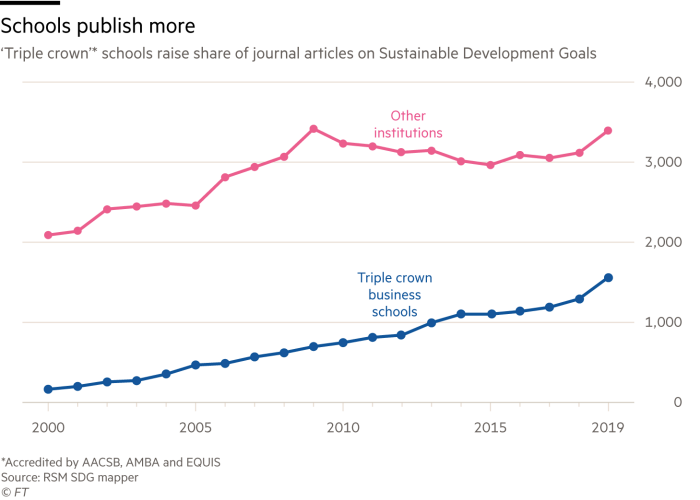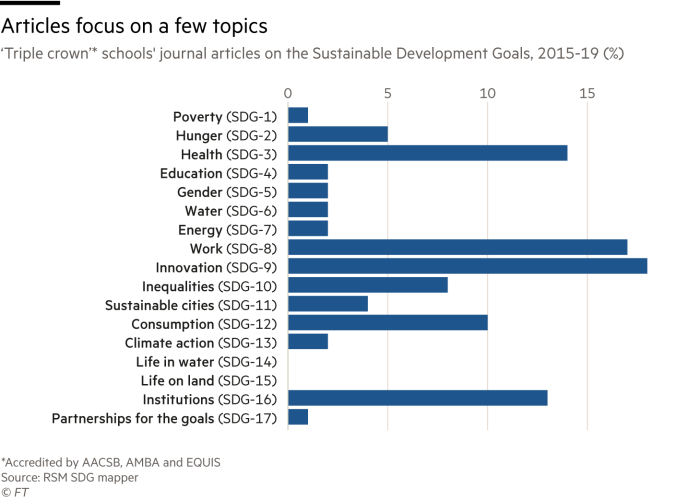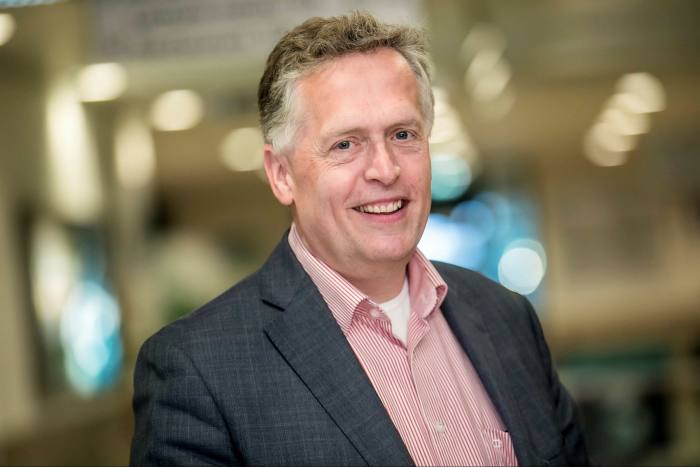Wilfred Mijnhardt has a difficulty. Europe is residence to some of the world’s oldest and most prestigious business schools, and it has been at the forefront of substantially of the worldwide innovation in educating and research on sustainability.
But when he analyses institutions’ efficiency dependent on their situation in in general rankings, allow on your own their academic research output, he finds a major mismatch with those people undertaking most to foster dependable business education.
Mijnhardt, plan director at Rotterdam School of Administration at Erasmus University, is a single of a growing selection of experts exploring ways to improved capture this kind of developments. It is also a concern on which the FT is reflecting and canvassing views in conjunction with academic and sustainability teams. Notably, Mijnhardt has mapped the backlinks amongst the business schools’ research output and the UN’s sustainable enhancement aims (SDGs).
“Business schools are lagging behind [other disciplines],” he says. “They imagine that if they create a several publications that count for rankings and accreditation applications, they are undertaking research. But this entire world is substantially larger than that and academic tradition is so substantially far more.”
Mijnhardt examined articles on SDGs composed by business faculty workers because 2015 that ended up posted in the FT50 record of influential journals. He found that the major establishments are ever more focused on the industry, with potent output in Europe from schools at the universities of Glasgow, Leeds and St Gallen, for instance.
But there are large gaps, with local weather adjust-similar subject areas explored far significantly less in these articles than themes this kind of as poverty reduction and innovation. Some of the articles with the best SDG relevance and impact are posted in far more obscure and significantly less properly-regarded journals.
Mijnhardt suggests business schools have moved far more bit by bit than other academic departments to work on far more interdisciplinary, collaborative and socially suitable themes. A single explanation is they are significantly less reliant on — and accountable to — external research funders which are ever more focused on the priorities of the SDGs. As an alternative, their research tends to be indirectly subsidised by substantial tuition costs or donations.
Jerry Davis, associate dean for business and impact at Ross School of Organization at the University of Michigan, is far more nuanced. “Business schools ironically are a single of the previous preserves wherever you are totally free to stick to your thoughts wherever it goes, mainly because you are not reliant on govt or company funding,” he says. “We have possibly far more academic liberty to uncover points.”

Educational facilities with the prestigious ‘Triple crown’ of accreditation from the AACSB, AMBA and EQUIS are publishing far more articles similar to UN sustainable enhancement aims in the FT50 record of influential academic journals utilized in business education rankings
Still in observe, as a founding member of Responsible Exploration for Organization & Administration (RRBM), a network of academics pushing for “credible and beneficial research”, he says far more demands to be done to reorient his peers’ functions to assignments and publications that supply higher societal impact.
A single critique of existing business faculty rankings, together with the FT’s, is that their calculations do not concentration so substantially on these subject areas. As an alternative, they draw on information details this kind of as salaries that do not reflect — and may even possibly undermine — growing desire by college students, college and employers for a higher emphasis on this kind of social intent, together with in their academic output.
But there is a far more essential challenge for those people keen to bring about adjust: the deficiency of consensus on ways to meaningfully assess this kind of functions. Other assessments focused on the SDGs count closely on subjective, qualitative judgments by college students and college. They are confined by reference to their own ordeals and establishments, with out an external benchmark.

Organization faculty academics have a tendency to concentration closely on unique SDGs, most notably wellness, innovation, work, intake and establishments, although subjects this kind of as the world, poverty, education and gender receive comparatively small attention
It is especially difficult to examine the impact of “environmental, social and governance” factors in classroom educating or alumni occupations. Even in academic research, prolonged scrutinised as a result of “bibliometrics” exploring the information all-around posted research, there is small settlement on which steps to use.
Focusing on the articles of articles that refer to the SDGs gives a proxy on the extent of activity all-around these challenges. But it provides only a crude yardstick for the originality, value or applicability of the underlying research.
Professionals this kind of as Amanda Goodall, associate professor at The Organization School, City, University of London (formerly Cass), advocate expanding the array of publications that are taken into account past those people in the widely recognised and prestigious FT50, to contain far more interdisciplinary and expert journals. That would enable for a wider wide variety of themes but could also dilute the perceived academic excellent.
Employing citations by other academics of articles would enable counter criticism by introducing a peer assessment of the excellent of any publication. But it does not give an indicator of the impact past college walls: the extent to which research is study, shared and applied by organizations, governments and other organisations. References to articles on social media present some external validation of fascination but also a substantial degree of “noise”. A improved tactic may well be get into account references to academic research in the media, expert blogs and plan papers.
These are some of the challenges on which the FT, RRBM, the UN’s Rules of Responsible Administration network and many others, together with the Globally Responsible Leadership Initiative of business schools, are searching for views.
Despite the troubles, Prof Davis is optimistic about academia’s potential to build alternate measurements, in component mainly because of clean fascination in societal impact in just education and past. “Millennials have a very potent feeling of social justice and the result of the work they do. I’m quite enthused by the coming generations,” he says.
Remember to share your views on how to improved measure academic research at ft.com/ft50







More Stories
The Concepts Of Branding
Branding Through Your Email Signature For Personal Trainers
Tips On Branding Your YouTube Channel